Nurses across England, Wales and Northern Ireland go on strike for the first of two days this month - considered the biggest industrial action in the NHS’s history. The walkout follows a dispute with the government over pay and will involve members of the Royal College of Nursing (RCN) in more than half of hospitals and community teams. Nurses will still provide life-preserving care, but other services, such as some cancer treatment or urgent testing, may be partially staffed.
Routine services - including planned operations such as knee and hip replacements - are expected to be badly affected. The second strike will take place in five days’ time - on 20 December. The Royal College of Nursing (RCN) is calling for a rise of 5% above the RPI inflation rate, which is currently above 14%. That would mean more than a 19% pay rise, which the government has said is unaffordable. NHS staff in England and Wales - including nurses - have been given an average increase of 4.75%. The lowest paid were guaranteed a rise of at least £1,400. In Northern Ireland, nurses have now been told they will receive the same pay award and the increase will be back-dated. In Scotland, NHS staff were initially offered 5%, which was later changed to a flat rate of just over £2,200 - and was rejected by the RCN. An improved pay offer averaging 7.5% has since been made and has been accepted by some unions. Others, including the RCN, are still considering it.
The RCN says this year's below-inflation pay award followed years of squeezes on nurses' salaries. It says average pay for nurses fell by 6% between 2011 and 2021 - once inflation is taken into account - compared with a 4.6% drop across the whole UK workforce. The RCN says this is compromising care, because it means the NHS is struggling to attract and retain nurses. But the government has said that this year's pay rise is in line with what the independent NHS Pay Review Body recommended.
Overall, around a quarter of hospitals and community teams in England and nearly all those in Northern Ireland and Wales will see nurses walkout on 15 and 20 December. In total, more than 70 NHS organisations will see strike action. All the health boards in Northern Ireland and all-but-one in Wales, the Aneurin Bevan, will see strike action take place. Emergency care will continue to be provided during the walkouts. GP services will be unaffected as nurses working in practices were not entitled to take part in the ballot. Strike action has been suspended in Scotland after ministers there made a fresh pay offer. It has been accepted by some unions, but others like the RCN are still consulting members.
The strike ballot was sent to 300,000 RCN members - representing around two-thirds of the nurse workforce. And because a series of individual ballots were held at NHS trusts and boards rather than one national ballot, nurses at more than 40% of England's hospitals, mental health and community services are not entitled to strike because the turnout was too low in those votes.




